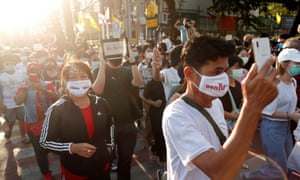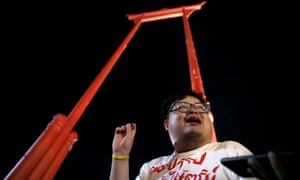Mostly student protesters demand dissolution of parliament, with some calling for reforms to the monarchy
Rebecca Ratcliffe in Bangkok
Mon 17 Aug 2020 04.37 BST

Demonstrators march during a protest demanding the resignation of Thailand’s prime minister Prayuth Chan-o-cha, in Bangkok, Thailand. Photograph: Jorge Silva/Reuters
Thousands of people have taken to the streets of the Thai capital Bangkok to step up demands for political change in one of the biggest protests against the country’s military rulers since the 2014 coup.
At least 10,000 demonstrators, mostly students, gathered at the city’s famous democracy monument on Sunday, some of them calling for reforms to the monarchy.
It follows a month of almost daily rallies that have drawn support from high school and university students across the country.
Protesters – who chanted, “Down with dictatorship, long live democracy” and “Stop harassing the people” – have called for the dissolution of the military-backed government. They have also demanded an end to the intimidation of activists and reforms to the constitution, which was written under military rule. Critics say the constitution unfairly allowed the prime minister, Prayuth Chan-o-cha, who first came to power during the 2014 coup, to win last year’s elections.
A statement released by Free People, a coalition of mostly student-led groups, which organised Sunday’s protests, said it aspired to see “democratic reform of government with the monarch truly under the constitution”.
In recent weeks, students have voiced increasingly direct criticisms of the monarchy, breaching a long-standing taboo.
Last week, at a rally attended by thousands, a protest group issued a 10-point list for reform of the monarchy – a move that shocked many – including allowing criticism of the monarchy, and called for the king’s powers to be curbed.
Thailand’s lèse-majesté laws are among the strictest in the world. Criticising the king can lead to a jail sentence of up to 15 years, though Prayuth has said the king requested that it should not be used at the moment. Such laws also limit media reporting within the country that relates to the royal family.
Thousands of people have taken to the streets of the Thai capital Bangkok to step up demands for political change in one of the biggest protests against the country’s military rulers since the 2014 coup.
At least 10,000 demonstrators, mostly students, gathered at the city’s famous democracy monument on Sunday, some of them calling for reforms to the monarchy.
It follows a month of almost daily rallies that have drawn support from high school and university students across the country.
Protesters – who chanted, “Down with dictatorship, long live democracy” and “Stop harassing the people” – have called for the dissolution of the military-backed government. They have also demanded an end to the intimidation of activists and reforms to the constitution, which was written under military rule. Critics say the constitution unfairly allowed the prime minister, Prayuth Chan-o-cha, who first came to power during the 2014 coup, to win last year’s elections.
A statement released by Free People, a coalition of mostly student-led groups, which organised Sunday’s protests, said it aspired to see “democratic reform of government with the monarch truly under the constitution”.
In recent weeks, students have voiced increasingly direct criticisms of the monarchy, breaching a long-standing taboo.
Last week, at a rally attended by thousands, a protest group issued a 10-point list for reform of the monarchy – a move that shocked many – including allowing criticism of the monarchy, and called for the king’s powers to be curbed.
Thailand’s lèse-majesté laws are among the strictest in the world. Criticising the king can lead to a jail sentence of up to 15 years, though Prayuth has said the king requested that it should not be used at the moment. Such laws also limit media reporting within the country that relates to the royal family.

Parit Chiwarak, a pro-democracy student, talks to the media at the Giant Swing. Photograph: Soe Zeya Tun/Reuters SWING?I THOUGHT IT WAS A GUILLOTINE!
No protesters have been charged under lèse-majesté laws, though three people have been arrested on other charges.
On Sunday, some students carried signs that made reference to the monarchy. One student wore a T-shirt that said: “Send love to Germany.” The king has been criticised by some for spending most of his time in Germany. Others in the crowds carried placards that reiterated previous demands for monarchy reform.
The protests are led by a new generation of emboldened young activists who use social media to mobilise.
“During my time, anybody who was an activist, they were called a redshirt and a low-key bandit or nation hater,” said a protester who graduated from Chulalongkorn University, a more conservative institution, in 2012.
After the 2014 coup, the military-backed government promised that it would offer stability and allow Thailand to prosper. “Such promises have not materialised,” he said, adding that this had left many young people, including students at his former university, feeling compelled to speak out.
On top of frustration over the economy, which was struggling even before the coronavirus pandemic, students say they are fed up with a government they accuse of undermining democracy.
Anger among students flared in February when the government dissolved an opposition party, Future Forward, which was especially popular among young people. Then, reports emerged that pro-democracy activist Wanchalearm Satsaksi had been abducted in Cambodia – the latest of several exiled activists to disappear in recent years. The government and the military have denied involvement.
“I don’t think that human rights can exist in a dictatorship,” said a 22-year-old student who asked not to be named.
In its statement on Sunday, the Free People group said there must be no coup d’état, nor a government of national unity installed.
Prayuth has said he was uncomfortable with comments made about the monarchy, but that he would listen to the concerns in relation to the constitution. Young people should be allowed to express themselves, within the limits of the law and with respect to others’ rights, his spokesperson has said.
Three protesters have been arrested over recent weeks, on charges including sedition, which carries a maximum seven-year sentence, and violating an emergency decree than bans public gatherings. The charges have been condemned by rights groups, who have accused the government of harassing its critics.
On Sunday, some students carried signs that made reference to the monarchy. One student wore a T-shirt that said: “Send love to Germany.” The king has been criticised by some for spending most of his time in Germany. Others in the crowds carried placards that reiterated previous demands for monarchy reform.
The protests are led by a new generation of emboldened young activists who use social media to mobilise.
“During my time, anybody who was an activist, they were called a redshirt and a low-key bandit or nation hater,” said a protester who graduated from Chulalongkorn University, a more conservative institution, in 2012.
After the 2014 coup, the military-backed government promised that it would offer stability and allow Thailand to prosper. “Such promises have not materialised,” he said, adding that this had left many young people, including students at his former university, feeling compelled to speak out.
On top of frustration over the economy, which was struggling even before the coronavirus pandemic, students say they are fed up with a government they accuse of undermining democracy.
Anger among students flared in February when the government dissolved an opposition party, Future Forward, which was especially popular among young people. Then, reports emerged that pro-democracy activist Wanchalearm Satsaksi had been abducted in Cambodia – the latest of several exiled activists to disappear in recent years. The government and the military have denied involvement.
“I don’t think that human rights can exist in a dictatorship,” said a 22-year-old student who asked not to be named.
In its statement on Sunday, the Free People group said there must be no coup d’état, nor a government of national unity installed.
Prayuth has said he was uncomfortable with comments made about the monarchy, but that he would listen to the concerns in relation to the constitution. Young people should be allowed to express themselves, within the limits of the law and with respect to others’ rights, his spokesperson has said.
Three protesters have been arrested over recent weeks, on charges including sedition, which carries a maximum seven-year sentence, and violating an emergency decree than bans public gatherings. The charges have been condemned by rights groups, who have accused the government of harassing its critics.
No comments:
Post a Comment